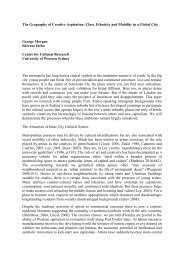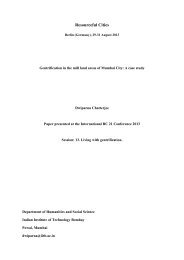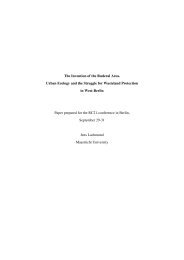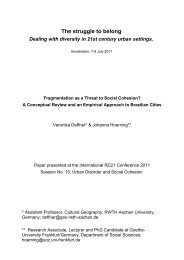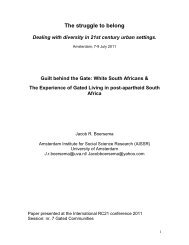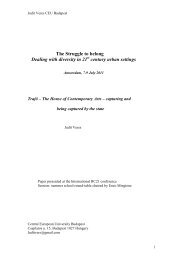The hidden side of metropolization. Governing squats and slums in ...
The hidden side of metropolization. Governing squats and slums in ...
The hidden side of metropolization. Governing squats and slums in ...
You also want an ePaper? Increase the reach of your titles
YUMPU automatically turns print PDFs into web optimized ePapers that Google loves.
13<br />
consequences <strong>and</strong> the implications for urban <strong>and</strong> regional plann<strong>in</strong>g (Legros, 2010). Also, it<br />
underl<strong>in</strong>es the deep hous<strong>in</strong>g shortage <strong>in</strong> Ile-de-France. This vision is supported by the action <strong>of</strong><br />
NGOs <strong>and</strong> local associations which defend Human Right <strong>and</strong> Roma populations. Moreover, left<br />
w<strong>in</strong>g local associations emphasize the fact that a city needs cultural diversity <strong>and</strong> promote the Roma<br />
people’s culture. <strong>The</strong>re are also some cases <strong>of</strong> right w<strong>in</strong>g association <strong>and</strong> neighborhoods’ committee<br />
which struggle aga<strong>in</strong>st the illegal occupations because they disturb the district.<br />
2.2. Multilevel Agendas <strong>and</strong> Governance conflicts: local vs. national, cities vs. State.<br />
Public problems are differently framed at different scales, depend<strong>in</strong>g on different visions <strong>of</strong> the<br />
problem. <strong>The</strong> State has the national legitimacy to impose one framework with the law, but the<br />
municipalities (left w<strong>in</strong>g local <strong>of</strong>ficials) act at the local level <strong>and</strong> succeed <strong>in</strong> develop<strong>in</strong>g another<br />
“public arena” (Gusfield, 1981).<br />
2.2.1. <strong>The</strong> national agenda: Agenda denial, redef<strong>in</strong>ition <strong>and</strong> crisis<br />
<strong>The</strong> agenda build<strong>in</strong>g is fragmented depend<strong>in</strong>g on the <strong>in</strong>stitutional scale. We have to dist<strong>in</strong>guish the<br />
national <strong>and</strong> the local agendas. On the one h<strong>and</strong>, the national agenda for <strong>squats</strong> <strong>and</strong> <strong>slums</strong> is “dead”<br />
<strong>and</strong> “empty”. <strong>The</strong> French Pre<strong>side</strong>nt’s speech about Roma people last summer was an exception. It<br />
was part <strong>of</strong> the large scale crim<strong>in</strong>alization process driven by the national right w<strong>in</strong>g government.<br />
Beyond this moment, the State only <strong>in</strong>tervenes for evictions. An eviction needs the juridical<br />
agreement from the judge who can require the <strong>in</strong>tervention <strong>of</strong> the police. <strong>The</strong>n, the local State<br />
representative (the Prefect) sends the police. Concern<strong>in</strong>g <strong>squats</strong>, however two moments which could<br />
reflect an attempt to implement a policy s<strong>in</strong>ce the 2000s can be observed. <strong>The</strong> first <strong>in</strong>itiative came<br />
from social hous<strong>in</strong>g developers which are very concerned by <strong>squats</strong>. <strong>The</strong> latter asked the local State<br />
<strong>and</strong> the m<strong>in</strong>istry to organize debates between the juridical <strong>in</strong>stitutions, the m<strong>in</strong>istry <strong>of</strong> Internal<br />
Affairs, the Hous<strong>in</strong>g M<strong>in</strong>istry <strong>and</strong> the Regional Assembly <strong>in</strong> order to make the national Law evolve<br />
<strong>and</strong> to f<strong>in</strong>d solutions. A first meet<strong>in</strong>g was organized <strong>in</strong> 2002. <strong>The</strong> Ile-de-France Regional Institution<br />
f<strong>in</strong>anced a survey on <strong>squats</strong> at the scale <strong>of</strong> the Region (Quercy, 2002). <strong>The</strong> survey is the first one<br />
which gives exhaustive data. However, the survey was not followed by concrete action <strong>and</strong> has been<br />
thrown out. A strong lack <strong>of</strong> political will<strong>in</strong>gness led to a govern<strong>in</strong>g failure.<br />
“Nobody wanted to build anyth<strong>in</strong>g. <strong>The</strong> problem seemed to be a juridical problem 11 <strong>and</strong> nobody<br />
wanted to change the law. Thus, after the meet<strong>in</strong>g we forgot everyth<strong>in</strong>g. If the Hous<strong>in</strong>g m<strong>in</strong>ister<br />
wanted to put it on the agenda it could have work but noth<strong>in</strong>g was done. So, no policy has been<br />
implemented at this moment” (Prefect <strong>and</strong> Former advisor <strong>of</strong> the prime M<strong>in</strong>ister <strong>and</strong> <strong>of</strong> the<br />
Hous<strong>in</strong>g M<strong>in</strong>ister).<br />
A second attempt took place <strong>in</strong> 2005 <strong>in</strong> a similar context. Hous<strong>in</strong>g developers asked a survey to the<br />
Region which organized a meet<strong>in</strong>g (AORIF, 2006). Aga<strong>in</strong>, nobody was <strong>in</strong>terested <strong>in</strong> this problem<br />
<strong>and</strong> the topic has been left to the responsibility <strong>of</strong> private owners <strong>and</strong> local actors. This failure <strong>in</strong><br />
creat<strong>in</strong>g an agenda on <strong>squats</strong> <strong>and</strong> <strong>slums</strong> could be <strong>in</strong>terpreted as an “agenda denial” situation (Cobb<br />
<strong>and</strong> Ross, 1997). <strong>The</strong> State decision makers avoid putt<strong>in</strong>g the problems on the agenda because they<br />
know that they don’t have the resources <strong>and</strong> are not able to resolve it because <strong>of</strong> juridical deadlocks<br />
<strong>and</strong> because <strong>of</strong> the municipalities’ <strong>in</strong>volvement <strong>in</strong> this field. Thus, the m<strong>in</strong>isters <strong>and</strong> the Prefects<br />
have no <strong>in</strong>centive to engage a large scale action.<br />
11 In France the Law is quite tolerant towards <strong>squats</strong>. Indeed, <strong>squats</strong> are con<strong>side</strong>red as a “civil” problem <strong>and</strong> not a “penal”<br />
problem as <strong>in</strong> Spa<strong>in</strong> for <strong>in</strong>stance.





